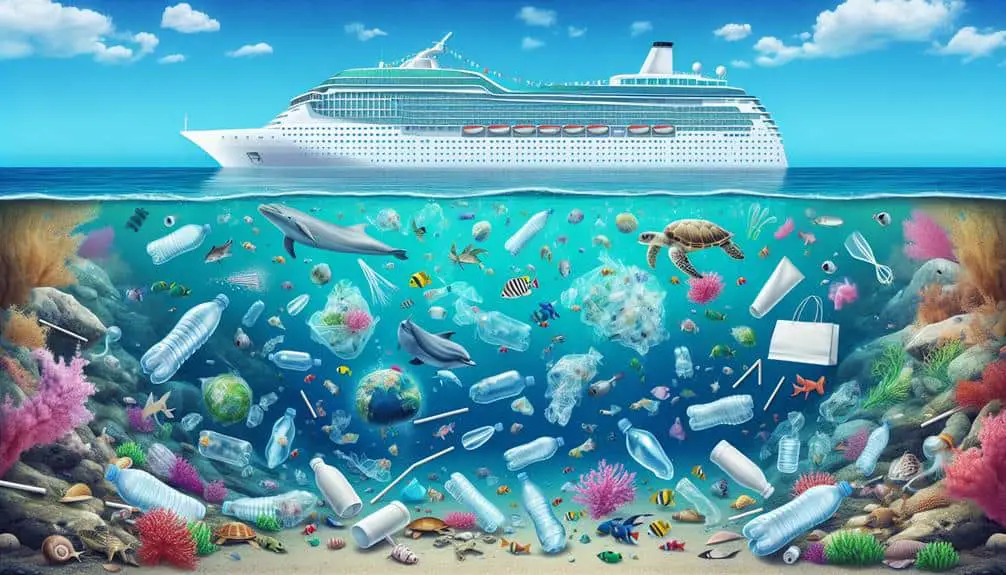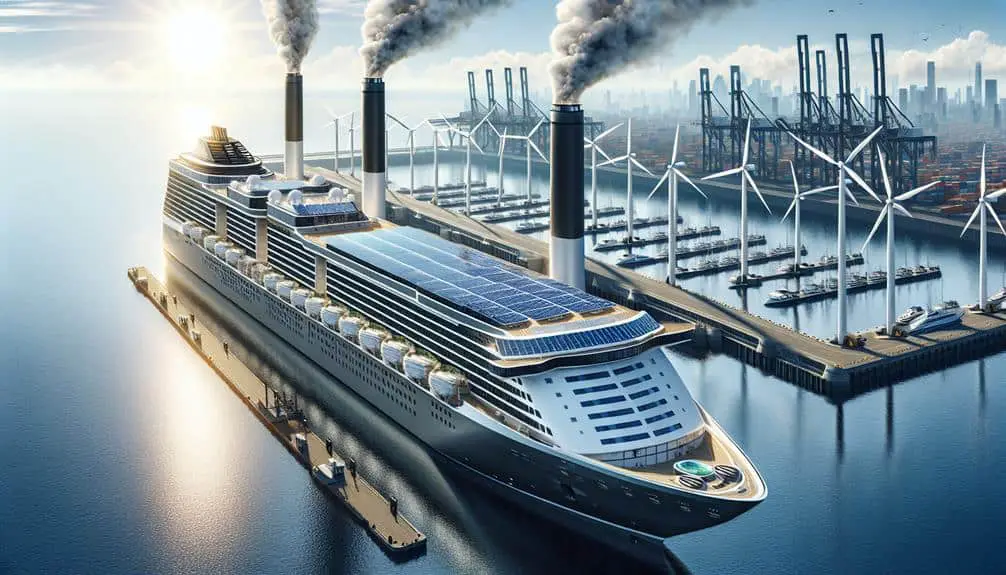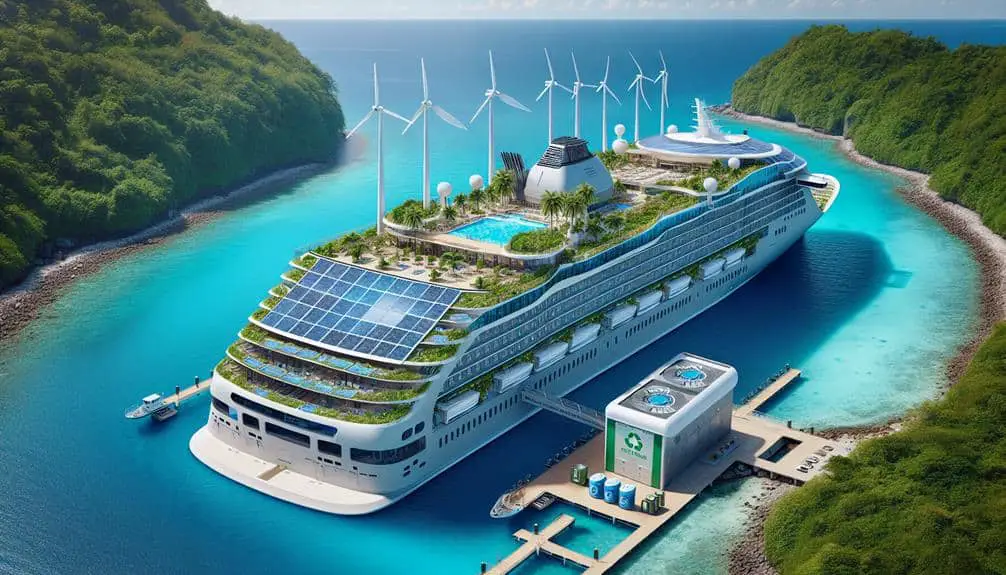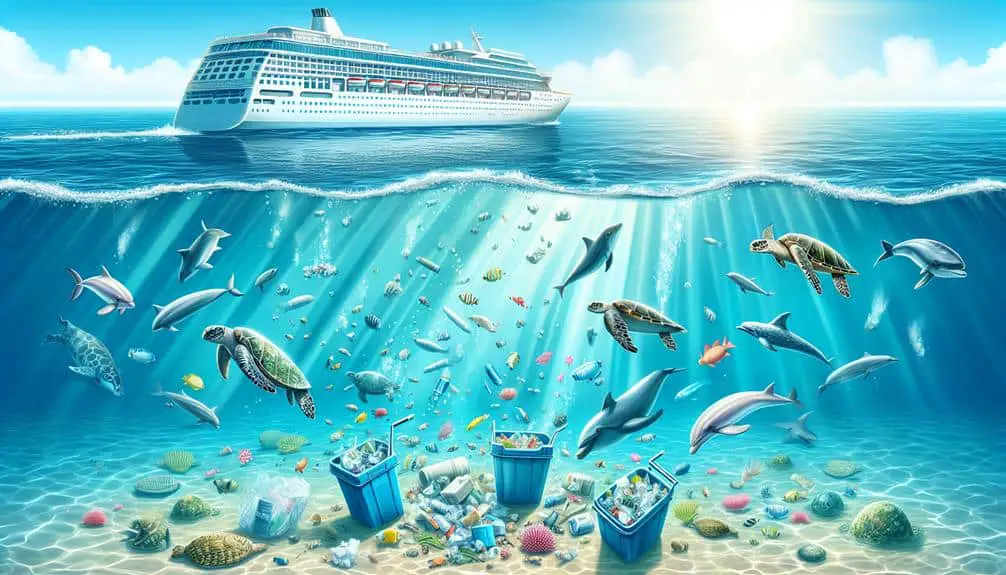Reducing single-use plastics on cruises is essential due to the harmful impact on marine ecosystems. Plastics threaten marine life, degrade into microplastics, and disrupt ecosystems. Biodiversity suffers, and harmful chemicals affect marine organisms. Sustainable initiatives onboard, like eco-friendly alternatives and waste management, aim to combat this. Benefits include decreased marine pollution, cost savings, and improved customer satisfaction. Challenges like logistical hurdles and cost implications exist. The future focuses on green technology and innovation for maritime sustainability. Prioritizing this effort is important for the environment and marine life.
Key Points
- Single-use plastics harm marine ecosystems and threaten marine life.
- Plastic pollution leads to bioaccumulation and disrupts marine ecosystems.
- Reducing plastic waste decreases marine pollution and carbon footprint.
- Eco-friendly practices improve customer satisfaction and loyalty.
- Sustainable initiatives on cruises benefit the environment and long-term cost savings.
Environmental Impact of Single-Use Plastics
The environmental impact of single-use plastics is a significant concern due to their widespread use and harmful effects on marine ecosystems. Plastic pollution poses a critical threat to marine life, with millions of tons of plastic entering the oceans each year. Marine ecosystems suffer as plastics degrade into microplastics, which are ingested by marine organisms, leading to bioaccumulation and ecosystem disruption.
Studies have shown that plastic pollution in marine ecosystems can have detrimental effects on biodiversity, with marine animals becoming entangled in plastic debris or mistaking it for food. This not only harms individual organisms but also has cascading effects on entire food webs. Additionally, the leaching of harmful chemicals from plastics further impacts marine ecosystems, affecting organisms at various trophic levels.
Addressing the issue of single-use plastics on cruises is essential to mitigating the environmental impact on marine ecosystems. By implementing sustainable practices and reducing plastic waste, the cruise industry can play a significant role in preserving these essential ecosystems for future generations.
Sustainability Initiatives on Cruise Ships
Implementing sustainable initiatives on cruise ships involves optimizing resource management to minimize environmental impact and enhance operational efficiency. To achieve this, cruise lines are increasingly turning to eco-friendly alternatives and adopting innovative waste management strategies. Eco-friendly alternatives include implementing advanced water purification systems to reduce plastic bottle usage, utilizing biodegradable cleaning products, and incorporating energy-efficient technologies onboard.
Waste management strategies focus on segregating and recycling waste to minimize landfill disposal, composting organic waste, and reducing single-use plastics through the use of refillable containers and biodegradable utensils.
Cruise ships are also investing in onboard facilities for waste sorting and recycling, raising awareness among passengers and crew about the importance of responsible waste disposal, and collaborating with suppliers to source sustainable products. These initiatives not only contribute to protecting marine ecosystems and coastal areas but also help cruise lines meet stringent environmental regulations.
Benefits of Reducing Plastic Waste
Hence, by reducing plastic waste on cruise ships, significant environmental benefits can be achieved, such as a decrease in marine pollution and a lower carbon footprint. Implementing plastic-free policies can result in substantial cost savings in the long term.
Studies indicate that the expenses associated with single-use plastics, including purchasing, disposal, and potential clean-up efforts, may exceed the costs of investing in reusable or biodegradable alternatives. Not only does the reduction of plastic waste help the environment, but it also improves customer satisfaction.
According to a research study by the International Journal of Contemporary Hospitality Management, customers show increasing satisfaction with eco-friendly practices, such as minimizing single-use plastics. This increased satisfaction can lead to higher loyalty and positive word-of-mouth recommendations, ultimately benefiting the cruise industry.
Hence, by reducing plastic waste, cruise ships can't only contribute to a cleaner environment and lower carbon emissions but also improve their financial bottom line and enhance customer experiences.
Challenges in Implementing Plastic-Free Policies
Challenges persist in the adoption of plastic-free policies within the cruise industry, hindering progress towards sustainability goals. When it comes to implementing plastic-free practices on cruise ships, several key obstacles stand in the way:
- Logistical Hurdles: Cruise ships operate on complex systems where every item brought on board is carefully planned to guarantee smooth sailing. Replacing single-use plastics with sustainable alternatives requires significant logistical adjustments to sourcing, storing, and distributing these new materials efficiently.
- Cultural Resistance: Changing established practices and mindsets is often met with resistance. Crew members and guests may be accustomed to the convenience of single-use plastics, making it challenging to shift towards more sustainable options. Overcoming this cultural resistance necessitates thorough education and engagement strategies.
- Cost Implications: Shifting to plastic-free policies can come with upfront costs for cruise lines. Investments in alternative materials, infrastructure changes, and staff training may initially strain budgets, requiring a careful balance between sustainability goals and financial considerations.
Future of Sustainable Practices at Sea
The evolution of sustainable practices at sea is crucial for the long-term environmental health of our oceans. Innovative solutions and the integration of green technology are becoming increasingly essential in shaping the future of maritime sustainability. Vessels are exploring various avenues to reduce their carbon footprint, such as adopting alternative fuels like liquefied natural gas (LNG) and biofuels, which emit fewer greenhouse gases than traditional marine fuels. Additionally, advancements in hull design and propulsion systems are enhancing fuel efficiency, leading to decreased emissions and overall environmental impact.
Moreover, the implementation of waste-to-energy technologies onboard ships is gaining traction, allowing for the conversion of organic waste into energy, thereby reducing the volume of waste generated during voyages. These initiatives not only contribute to a cleaner marine environment but also align with international regulations aimed at mitigating climate change. Embracing these sustainable practices not only benefits the marine ecosystem but also sets a precedent for the future of responsible maritime operations.
Frequently Asked Questions
How Do Cruise Ships Manage Waste Disposal in Remote or International Waters?
When at sea, cruise ships handle waste disposal through advanced onboard waste management systems. To protect the environment, these systems treat, recycle, and safely store waste. This process minimizes the environmental impact of cruise ships in remote or international waters.
Are There Any Potential Health Risks Associated With Using Reusable Products on Cruises?
Potential concerns related to health risks on cruises when using reusable products are minimal. Studies show that proper cleaning and maintenance greatly reduce potential hazards. Enjoy your journey with peace of mind and environmental responsibility.
What Alternatives to Single-Use Plastics Are Currently Being Tested or Developed for Use on Cruise Ships?
Explore eco-friendly solutions like biodegradable materials as cruise lines prioritize sustainability efforts. Innovative technologies are being tested to reduce single-use plastics onboard, showcasing a commitment to environmental stewardship and responsible waste management practices.
How Do Cruise Lines Ensure That Waste Is Properly Recycled or Disposed of When They Return to Port?
You guarantee waste is handled responsibly. Recycling practices are essential. Proper waste management at ports is crucial. Cruise lines implement systems for efficient waste disposal. They aim for sustainability and eco-friendly solutions.
How Do Cruise Lines Address the Issue of Plastic Pollution in Areas Where They Dock for Excursions or Activities?
You address plastic pollution in dock areas by forming local partnerships and implementing sustainability initiatives. Cruise lines offer eco-friendly excursions, engaging with communities to promote responsible waste management and conservation efforts, contributing to a cleaner environment.




